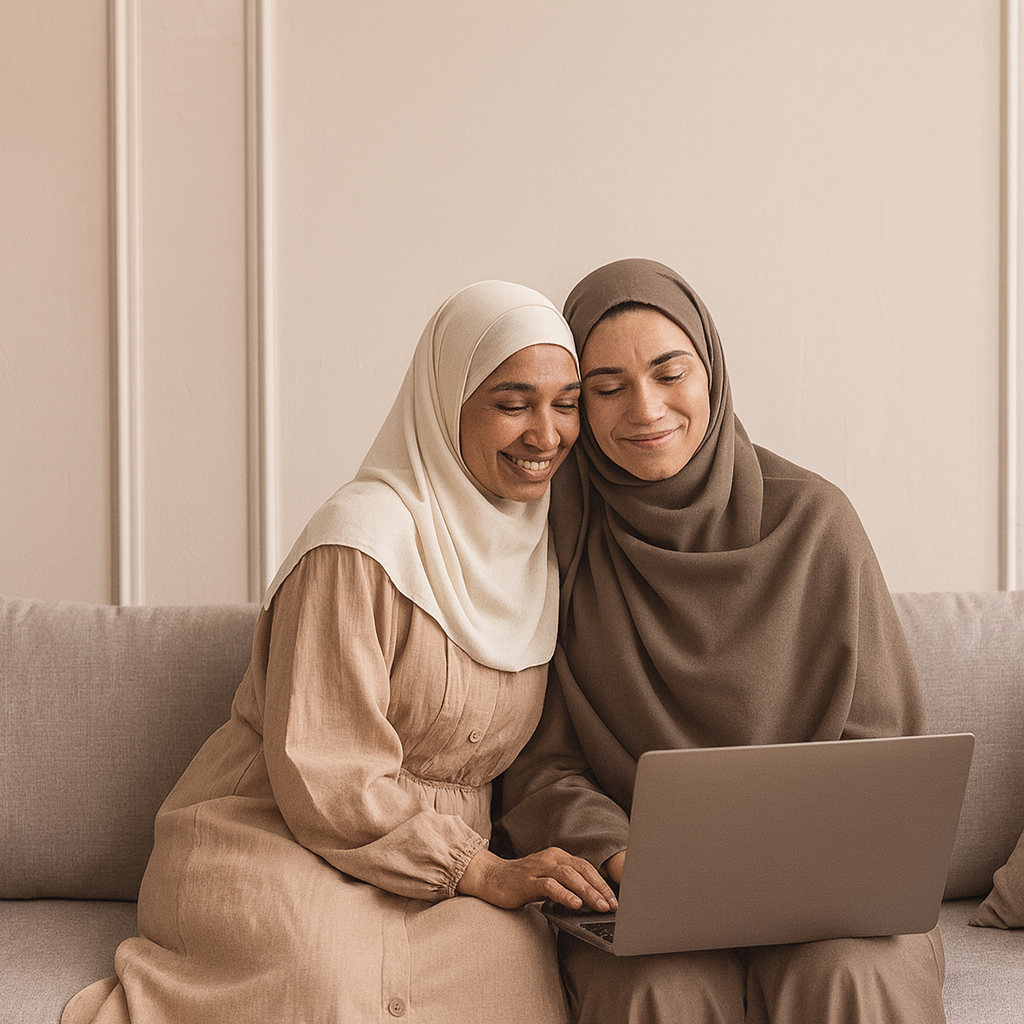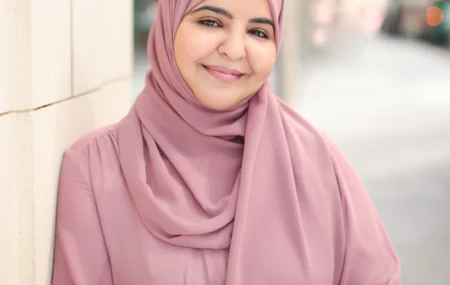
“This is what Allāh has written for the daughters of Ādam”: An Islamic View of Menstruation and Mercy
During Ḥajj, when ʿĀʾishah (raḍiy Allāhu ʿanhā) began her period, the Prophet ﷺ comforted her: “This is a matter Allāh has decreed for the daughters of Ādam. Do all the rites except ṭawāf.” (Ṣaḥīḥ al-Bukhārī) His words are gentle and clear. Menstruation is not a flaw, a curse, or a sign of distance from Allāh ﷻ. It is divinely ordained — a natural part of a woman’s life that the Prophet ﷺ met with tenderness. When a woman pauses certain acts of worship, she does so in obedience; and that obedience is worship.
The Qur’ān also honours the womb and what it represents: “O people, be mindful of your Lord, who created you from a single soul and created from it its mate, and spread from the two many men and women. And be mindful of Allāh, through whom you ask one another, and the wombs. Indeed, Allāh is ever, over you, an Observer.” (Qur’ān 4:1)
This honour is not abstract. In the Sīrah, it appears as keeping family ties, recognising the sanctity of motherhood, and treating menstruating women with warmth and dignity. In this piece, we explore the Islamic view of menstruation. You’ll find clear rulings, the Prophetic example, and practical ways to revive a culture of dignity and care.
The fiqh of menstruation
In fiqh, menstruation is called ḥayḍ. It is a form of major ritual impurity (ḥadath akbar) that has its own rulings, distinct from janābah (the post-sexual state). A menstruating woman is ritually (not physically) impure. She is not sinful, not dirty, and her person, clothing, and touch remain pure (ṭāhir) unless actual blood is present.
During ḥayḍ, she refrains from acts such as:
- Ṣalāh (prayer) and ṣawm (fasting).
- Ṭawāf of the Kaʿbah.
- Sexual intercourse (by explicit Qur’ānic command; see below).
These limits are a divine concession (rukhaṣ) during a time of physical and emotional change. When bleeding ends, she performs ghusl and returns to worship as normal. You can read more about the fiqh of hayd in more detail here and here.
Spiritually, a woman continues her life as usual: she may make dhikr, duʿāʾ, send ṣalawāt upon the Prophet ﷺ, seek knowledge, give charity, support family, and attend gatherings. Scholars differ on details such as reciting Qur’ān from memory or entering the masjid (e.g., for lessons) when there is no risk of soiling the prayer space. Feel free to ask your local ustadhah on these points. For more suggestions on how to structure a peaceful “dhikr week,” learn more.
Ḥayḍ as mercy: how Islam honours menstruation
In Islam, everything in nature, including our bodies and their functions, is signs of Allah. Menstruation (ḥayḍ) is not viewed as something shameful or impure in essence. Rather, it is a divinely created process, part of Allah’s wisdom and mercy in the design of the female body.
Allah ﷻ addresses menstruation in Surah al-Baqarah, verse 222 directly:
وَيَسْـَٔلُونَكَ عَنِ ٱلْمَحِيضِ ۖ قُلْ هُوَ أَذًۭى فَٱعْتَزِلُوا۟ ٱلنِّسَآءَ فِى ٱلْمَحِيضِ ۖ وَلَا تَقْرَبُوهُنَّ حَتَّىٰ يَطْهُرْنَ ۖ فَإِذَا تَطَهَّرْنَ فَأْتُوهُنَّ مِنْ حَيْثُ أَمَرَكُمُ ٱللَّهُ ۚ إِنَّ ٱللَّهَ يُحِبُّ ٱلتَّوَّٰبِينَ وَيُحِبُّ ٱلْمُتَطَهِّرِينَ ٢٢٢
“They question you (O Muhammad) concerning menstruation. Say: It is a painful thing, so let women alone at such times and do not engage in sexual intercourse with them till they are cleansed. And when they have purified themselves, then approach them as Allah has enjoined upon you. Truly Allah loves those who turn unto Him, and loves those who have a care for cleanliness.”
From this verse we can see that Allah not only acknowledges menstruation but also gives respite to menstruating women by absolving them of certain actions. He ﷻ is our Creator and His knowledge is beyond us, so for Allah not to be merciful and understanding of such a delicate phase, is out of question. Classical scholars such as Imām al-Qurṭubī also note that the verse charts a balanced middle path: it prohibits intercourse while preserving affection and companionship.
The Prophet ﷺ made this balance practical. When asked how to treat menstruating wives, he said: “Do everything except intercourse,” and “For you is what is above the izār (waist-wrapper).” (Ṣaḥīḥ Muslim; Sunan Abī Dāwūd) In other words, marital tenderness continues; only vaginal intercourse is paused until purification. From a health perspective, avoiding intercourse during active bleeding can reduce irritation and the risk of infection at a time when tissues are more sensitive.
This exemption isn’t a punishment or a sign of inferiority; rather, it’s a recognition of their natural state and a dispensation granted out of compassion. Furthermore, if a menstruating woman fulfils this command with the intention to submit to Allah’s order, she is actually worshipping Allah the entire time that she refrains from the ritual prayer and ritual fasting. The Prophet ﷺ taught a wider principle of reward:
“When a slave falls ill or travels, then he will get reward similar to that he gets for good deeds practiced at home when in good health.” (Sahih al-Bukhari)
Ibn Ḥajar explains in his Fath al-Bari that this hadith applies to any person who used to perform a good deed and was hindered from doing it. By analogy, a menstruating woman who would normally pray or fast still receives reward for her intention and patience while she lawfully pauses.
How the Prophet ﷺ treated menstruating women
The Prophet’s ﷺ home was the first classroom of compassion. While some communities in his time avoided eating, drinking, or sitting with menstruating women, the Prophet ﷺ opposed this. He modelled sharing food and space, and keeping women within the warmth of family life. His words and his actions dispelled stigma and taught the community how to treat women in ḥayḍ.
1) Comfort, not blame
The Prophet ﷺ said to ʿĀʾishah (raḍiy Allāhu ʿanhā) when she began her period during Ḥajj: “This is a matter Allāh has decreed for the daughters of Ādam. Do all the rites [of Ḥajj] except ṭawāf” (Ṣaḥīḥ al-Bukhārī). He ﷺ did not treat her state as abnormal or shameful. He simply explained the rulings that applied to her and adjusted plans.
Another beautiful example is Umayyah bint Qays (raḍiy Allāhu ʿanhā), who began menstruating while riding behind the Prophet ﷺ on the way to Khaybar. Embarrassed by a stain on the luggage, she tried to hide it. The Prophet ﷺ noticed her discomfort, gently instructed her on how to cleanse herself, and later gifted her a necklace with his own blessed hands — a gift she cherished for life.
Seen through the lens of Qurʾān and Sunnah, ḥayḍ (menstruation) and nifās (postpartum bleeding) are not burdens to hide; they are seasons that can draw a woman closer to Allāh ﷻ.
2) Closeness and affection
He ﷺ remained lovingly affectionate with his wives during their periods. He rested his head in ʿĀʾishah’s (raḍiy Allāhu ʿanhā) lap while she was menstruating and recited Qurʾān (Ṣaḥīḥ al-Bukhārī). He drank from the same cup she had used, at the very same spot (Ṣaḥīḥ Muslim). When Umm Salamah (raḍiy Allāhu ʿanhā) quietly stepped away on realising her period had begun, he ﷺ called her back to lie beside him under the same cover (Ṣaḥīḥ al-Bukhārī). His conduct makes it clear: a woman’s person remains worthy of tenderness and companionship.
3) Everyday companionship
Ordinary family life continued . When ʿĀʾishah (raḍiy Allāhu ʿanhā) hesitated to pass him a prayer mat because she was menstruating, he said, “Your menstruation is not in your hand,” affirming that her touch was not impure. Maymūnah (raḍiy Allāhu ʿanhā) would lie near his prayer place while she was not praying; when he prostrated, his clothing sometimes touched her. Home remained a space of living and nearness (Ṣaḥīḥ al-Bukhārī; Ṣaḥīḥ Muslim).
4) Questions are welcome!
Where cultures create silence, Islam invites respectful questions. ʿĀʾishah (raḍiy Allāhu ʿanhā) praised the women of the Anṣār because shyness did not stop them from seeking knowledge (Muslim 332c). The Prophet ﷺ also taught that “the cure for ignorance is to ask” (Abū Dāwūd 336), and the Qurʾān instructs us to ask the people of knowledge when we do not know (Q 16:43).
The ḥadīth collections record many questions asked by women. At times, women hesitated to ask personal questions in the presence of men. To address this, the Prophet ﷺ set aside a special day just for women, where they could ask him anything they wished. This gave them the dedicated space they needed to learn about the dīn. Below are some examples of the kinds of questions asked:
- Fāṭimah bint Abī Ḥubaysh asked about continuous bleeding. The Prophet ﷺ explained how to distinguish true menses from a vessel-bleed and when to pray, offering clear, practical guidance (Bukhārī 303).
- Asmāʾ (daughter of Shakal) asked about ghusl after menstruation. He ﷺ described how to wash thoroughly — down to using water with lote leaves and ensuring water reaches the roots of the hair — and clarified perfuming the area after bleeding ends. When she asked further, he responded with dignity and detail; ʿĀʾishah added a gentle clarification (Muslim 332c).
This is the Sunnah we can revive in our homes and communities today.
Takeaways
- Teach early, teach kindly. Give girls age-appropriate, accurate knowledge so they feel prepared rather than afraid.
- Use prophetic stories. Share how the Prophet ﷺ treated his wives during menstruation, with dignity and affection, to correct harmful myths.
- Create an open-door policy. Make space for questions about physical changes, emotions, and common misconceptions. Answer simply and without embarrassment.
- Balance openness and privacy. Respect personal boundaries; offer information and support without pressure.
- Include men. Fathers, husbands, and brothers should learn the basics so they can support with empathy and practical help.
- Normalise in daily life. Treat periods as routine at home, school, and work (e.g., access to products, bathroom breaks, flexible expectations on difficult days).
- Educate together. Host workshops in mosques, schools, and community centres on menstrual health, hygiene, and fiqh basics.
- Serve others. Join initiatives that provide sanitary products locally and globally; seeing menstruation in a wider context fosters compassion and purpose.
- Debunk myths. For gentle myth-busting grounded in dīn, read more.
Guidance for couples
Affection continues; only intercourse is paused during menses. Keep communicating about comfort, energy, and pain. Be practical and tender, offer heat packs, share chores, slow the pace when needed, and sustain emotional intimacy. Read more!
A closing reminder
Menstruation is part of Allāh’s ﷻ mercy and wisdom. Islam meets it with clear guidance and genuine compassion. The Prophet ﷺ taught us to honour women in every phase with closeness, patience, tenderness, and respect. This monthly rhythm is sacred; it deserves dignity, sound knowledge, and thoughtful care.
May we carry that prophetic character in our homes and communities – wa bi tawfīqillāhi subḥānahu wa taʿālā.

